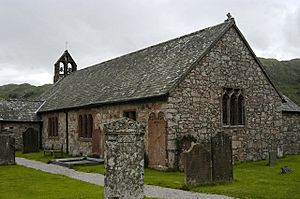St Catherine's Church, Boot facts for kids
Quick facts for kids St Catherine's Church, Boot |
|
|---|---|

St Catherine's Church, Boot, from the southeast
|
|
| Lua error in Module:Location_map at line 420: attempt to index field 'wikibase' (a nil value). | |
| OS grid reference | NY 176,003 |
| Location | Boot, Cumbria |
| Country | England |
| Denomination | Anglican |
| Website | St Catherine, Boot |
| History | |
| Status | Parish church |
| Dedication | Saint Catherine |
| Architecture | |
| Functional status | Active |
| Heritage designation | Grade II |
| Designated | 8 September 1967 |
| Architect(s) | Paley and Austin (restoration) |
| Architectural type | Church |
| Specifications | |
| Materials | Stone, slate roof |
| Administration | |
| Parish | Eskdale |
| Deanery | Calder |
| Archdeaconry | West Cumberland |
| Diocese | Carlisle |
| Province | York |
St Catherine's Church is in the small village of Boot in Cumbria, England. It is an Anglican parish church for the area called Eskdale. This means it is the main church for the local community.
The church stands next to the River Esk. It is about 0.6 miles (1 kilometer) south of the village center. St Catherine's Church is a very important building. It is listed as a Grade II listed building on the National Heritage List for England. This means it is a special building that needs to be protected because of its history and architecture.
Contents
History of St Catherine's Church
Early Beginnings and Legends
There has been a church on this spot since the 6th century, which is a very long time ago! A local story says that a hermit (someone who lives alone for religious reasons) lived near the church in the 7th century. He is said to have created a holy well on Arment Hill. People still use water from this well for baptisms today.
The church building you see now was first built around 1125. It was founded by William de Meschines of Egremont Castle.
Changes Over Time
The church building we see today mostly dates from the 14th century. However, it has been changed and added to many times since then. In 1881, the church was restored by architects named Paley and Austin. They added new seats, making space for 126 people. They also built a vestry, which is a room in a church used for changing robes or storing things. This work cost £750 at the time.
Interesting Gravestone
In the churchyard, there is a special gravestone. It belongs to Thomas Dobson, who passed away in 1910. He was the master of the Eskdale and Ennerdale Foxhounds for 53 years. This gravestone is known as the "Huntsman's Grave." It has carvings of Dobson's huntsman's horn and two heads sticking out: one of a fox and one of a hunting dog.
Architecture of St Catherine's Church
Outside the Church
St Catherine's Church is built from random rubble stones. It has a slate roof with a stone ridge along the top. The church has a simple design, with one main section divided into four parts. There is also a porch on the south side.
At the west end of the church, there is a double bellcote with a pointed top. This is where the church bells are kept. There is also a cross at the very top of the east end of the church. Most of the side windows were replaced in the 19th century. They have mullions, which are vertical bars that divide the window into sections. The east window has three sections and features Decorated-style tracery, which is the stone pattern in the upper part of the window.
Inside the Church
Inside St Catherine's Church, you will find an octagonal font. An octagon is a shape with eight sides. The bowl of the font has carvings on each face. These carvings are in low-relief, meaning they stick out only a little bit from the surface.
On the south wall, there is a board from 1798 that lists people who have given money or gifts to the church. All the stained glass windows in the church were made between 1889 and 1896. The glass in the east and west windows was made by Gibbs and Company. The windows on the north and south sides were made by A. Savell and Company.
The east window shows three important figures: Saint Catherine, the Good Shepherd, and Saint Cecilia. Windows on the south side of the church show the Annunciation, which is when the angel Gabriel told Mary she would have a baby. On the north side, a window shows the Last Supper, a famous meal Jesus had with his disciples. One of the bells in the bellcote is very old; it was made in 1445!
Images for kids
See also
- Listed buildings in Eskdale, Cumbria
- List of ecclesiastical works by Paley and Austin
 | Janet Taylor Pickett |
 | Synthia Saint James |
 | Howardena Pindell |
 | Faith Ringgold |


